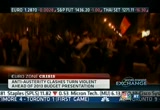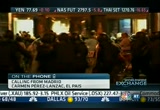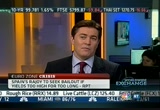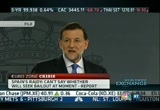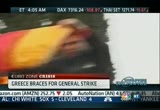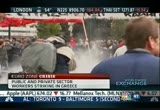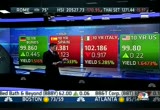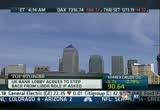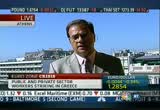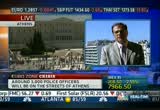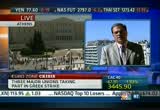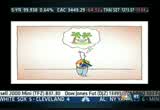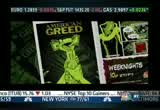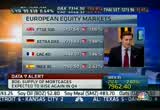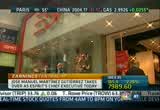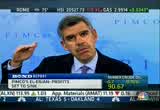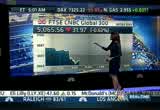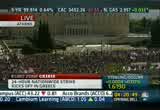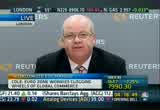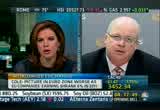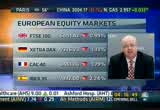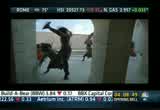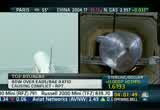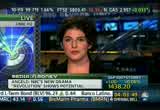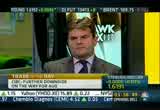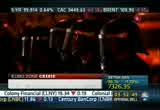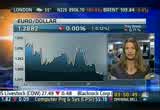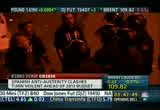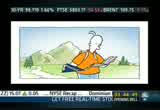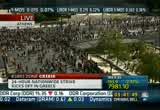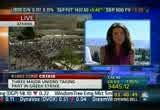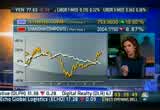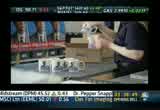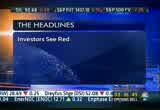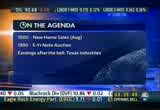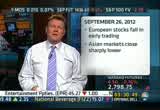tv Worldwide Exchange CNBC September 26, 2012 4:00am-6:00am EDT
4:00 am
hello, welcome to "worldwide exchange." >> these are your headlines from around the world. >> spain could see a round of fresh strikes tonight after protests in madrid and barcelona turn violent. >> police on high alert following the events in spain as the new coalition government in athens braces for its first strike. >> japanese auto makers scale back production in china as anti-japan protests take their
4:01 am
share. shares of toyota and nissan slam in reverse. >> you're watching "worldwide exchange," bringing you business news from around the globe. welcome to today's program. the conference board measure went up. ignored that yesterday. >> u.s. consumers are about the only consumers who seem to be doing somewhat better these days. certainly not the case across most of europe. >> not that happy in spain. spanish police and protesters clashing in madrid last night. thousands descended on the country's parliament, demanding fresh elections and an end to cuts and tax hikes. joining us on the phone is a reporter for the newspaper. i think you've been up all night. how would you describe the mood
4:02 am
on the streets and the strength of these clashes? >> reporter: people were, like -- people feel this anger toward politicians due to the cuts, to the social cuts. it was tense. clashes were very violent. and they happened, like, suddenly. and there were many people with terrible wounds. it was a terrible image. >> what spurred the violence and how unexpected was that these protests saw such violence? >> reporter: the people that were calling for these protests were not really organized, so it was difficult for the police and for the journalists and for everyone to see what could happen. they're not an organized group, so it was like okay, let's find
4:03 am
out what kind of people are going to be coming today and it was very, very wise. there were old people that have been -- their salaries have been, well, cut. there were young people who were having protests and there were some violent people also who started the clashes with the police. >> just a final question here. despite these protests, is there any expectation among the people that things are going to change? we're going to get a budget out tomorrow. are they protesting with the knowledge that nothing much different will happen? >> reporter: i think so, yes. i'm afraid so. that's why there is this anger because it seems a year and a half ago when the protests started, in may when there was a big protest with young people mainly, nothing has changed. their anger is growing because
4:04 am
there are no really -- the feeling is that the people who are responsible for this are not responding before justice. so i don't think it's going to change much. >> carmen, thanks very much for that. the pressure continues to pile on spain's government. andalucia has become the latest region to say it may request aid. the prime minister has said he cannot say at the moment whether he would ask for a full bailout. the region is now pressing for independence from the sovereign saying it has had enough of propping up the country's poor regions. ross, a reminder that perhaps a lot of the regions are giving more to the central government than they're receiving. that's fostering clearly some unrest here. but there's also concern about some of these regions that are drawing more and more on the
4:05 am
financing line from the spanish government, potentially putting its sovereign risk further at risk. >> and this election we're going to get -- i mean, that could turn into a referendum about whether cat loan ya wants to remain a part of the federal country. meanwhile, a day after, greece's new government is facing its first general strike. june- julia is in athens in the square where those protests are happening. what is going to happen today? >> reporter: well, this has been organized by the two largest unions, the private and the public sector. in terms of people, we're talking one and a half million workers involved. if you look at the poll readings lately, 90% of respondents in
4:06 am
some cases saying that they are unhappy with the current government and the cuts. it tends to suggest the turnout today could be pretty high. what we've seen so far this morning, armored police trucks arriving. what we've seen in the last ten minutes is military police and policemen moving in front of the parliament building. protesters starting to arrive in the square, expecting them to arrive the next half an hour in full. so we'll certainly keep you updated as the people begin to arrive. we'll also become bringing you economic analysis of the situation in greece. so plenty to come from here in athens. for now, back to you. >> thanks very much indeed for that. let's just show you how this will translate. as you can see, there's only about ten or 12 stocks at the moment which are in positive territory. the ftse was up a third of a percent. we are down fairly heavily. and on the session low right now, just over an hour to trade
4:07 am
here in europe. these are numbers on the board for you. a number of earnings out today. london stock exchange not doing too well. the ibex down 2.5% as well. plasser saying he's opposed to qe-3 because it won't help the economy. as far as bond yields are concerned, nudging ever close to the 5% mark in italy. we have got italy today with a bell auction. we'll get the results of that a little bit later. u.s. yields continue to fall back down lower at 1.46%. sterling/dollar is a little bit low. aussie/dollar is low. so the dollar having a good day apart from against the euro/dollar. starting to raise the gains
4:08 am
we've made post the ecb out of the constitutional court. that's where we stand in european trade. what about in asia today? lisa has the details once again out of singapore. >> thanks, ross. the shanghai composite is not far from that all important 2,000 point mark. investors would have been much better off investing in greece instead of china. year to date stocks gained over 10% increase, but down about 9% in china on growth concerns and political uncertainties. today the shanghai composite was dragged down by resource and steel makers. property corps is down 1.2%. the hang seng physicaled suit. industrial resources and consumer goods weighed it down. the japanese market ended at a
4:09 am
two-week low. many stocks picked up yesterday were sold off today as companies traded. auto makers also took the brunt of selling. we'll hear more on this from the nikkei business report a little later in the show. meanwhile, shipbuilders and financials weighed on the cost, but hyundai motor is the ben fishy of the anti-japan sentiment in china. australian miners ended lower. it's down by about a quarter of a percent. that's all from me. back to you. >> thanks very much. fascinating to look at how much better off you would have been buying into greece than china this year. just want to bring you this news from tom enders. he's saying the valuation ratio for the fusion with bae is fair, that industrial companies shouldn't be driven by state interest and that he's open to talks with government at any
4:10 am
time. coming under some scrutiny this morning as fair and that he shouldn't necessarily be subject to state involvement. meanwhile, back to spain. the available data right now suggests that the gdp kept falling at a significant rate in the third quarter. >> yeah, great. and against that backdrop, a new s&p report just out is talking about how europe corporate defaults are rising as eurozone woes are rising, especially when you look at the glut of credit markets. to talk more about this, we're joined now by paul cavanaugh. an ugly day in the markets. what's going on? >> well, we've had such low volatility through september. i saw a five-day historic volatility measure of one, which is the last time we've seen and that was 2006. >> 2006. >> 2006. let's put it into context.
4:11 am
markets around the world haven't had a bad year. the dax is up 20%. >> 25%, i think. >> so we're seeing a little bit of a correction today. but we're in a phase where we're dealing with tangibles and the intangibles. will his plan work? will he gate bailout from spain making that request? will qe work in the u.s.? a lot of intangibles there, which i think markets will fret about. >> would you describe this as consolidation after the rally that we've seen, or would you describe it as the beginning of a period of more volatility and investors should be more concerned? >> i think volatility is going to pick up. the other issue that is taking place, in america, we have seen three big names warn on profitability, caterpillar, intel, fedex. so we've seen the tangibles of corporate earnings coming under some pressure now and some key business decisions being made as a result of the uncertainty in the macro environment. >> the dow up 10%. the s&p 500 up nearly 500.
4:12 am
nasdaq up nearly 20%. the dax up 25. pretty nice gains. at the beginning of the year, you would have taken all of those for the year, right? >> certainly. the reason being, actually stocks and corporates are generally in this economic crisis that we're seeing around the western world are the safe haven. you don't want exposure to governments. you don't want exposure to consumers. the corporates can manage their cost base. they can move where the demand is much more freely than say consumers can and governments can. so at the moment, money's got to go somewhere and it's hard to get too bearish on equities, given the yields and actually how demand is holding up for these organizations. >> that's what you were talking about, where else that money might go. so look, for example, at corporate credit where we've seen such an inflow into high yield. we've seen high yield returning in the range of 17% this year. so if you look into next year when it already looks rich and
4:13 am
say i'd rather perhaps take the potential for that upside on the equity side as opposed to this kind of run-in, when as we're seeing, warnings started to come out about corporate defaults. >> that's right. do talk to asset managers about where the fund inflows are coming into at the moment. they're certainly going into asia. aberdeen asset were talking about money going into asia. but the area where there's the biggest bubble potentially is in corporate credit. the demand for income is such to the extent that these funds that are chasing income, not just in corporate equities, but corporate bonds, is ballooning at the moment and really we just need to get more product. >> maybe the sector was due for a rerating because big companies are safer from big countries. they are, aren't they? to see that narrowed down -- >> that has certainly been the call over the last two or three years. question is have we now got a developing theme here, because literally every guest you will see is going to tell you that we're going to be chasing income at this stage. >> they have been doing that for
4:14 am
the last two years. >> and of course, the long interest rate. you can't sit here and say -- when do interest rates start going up? it's not going to be potentially for another five years. so there's still momentum in that gain. but there's a lot of fund inflows to the asset managers. >> let's look at another story with you as well. the british association has decided to step back, but if pressed by regulators, the concession comes ahead of expected proposals from the fsa to tighten control over the scandal hit benchmark lending rate. believed one of the main reforms will be to strip the bba of its supervisory role. we've also had some corporate numbers out of the uk. global market activity remains subdued. suggested that regulators were close to given the green light for the new regulation on the swaps industry. a slight contrast on the stock
4:15 am
exchange. it says trading has fell a fifth over the summer. profits will be down 5% on the same period last year. >> lloyds of london has reported a swing to profit in the first half of the year, owing to a steep drop in major natural disaster claims. the insurer said claims were down 32% year on year. >> all right, just looking at those. paul, you're a broker. you know what volumes have been like. how tough is it for the brokers -- >> volumes have been done very significantly. we're look at 30% to 40% declines in volumes at markets at the moment. what icap reported today was a 14% decline. in january, that was 19%. holding out for some hope that september is better. it's been noticeable that what markets do need is volatility. and we just haven't had that up until now. that's where the volume is gone. >> what about insurance market? lloyd says this year is a much better year for claims, right,
4:16 am
than last year. so if you look at the insurers that you can invest in, what do you see? >> at the moment, i think that market is holding up reasonably well. the market over the last ten years, the whole entire insurance market through lloyd's has tightened up its regulation through discipline and risk management and that has had an effect of allowing these businesses to operate in a safer environment and for ratings to get better. obviously you do have the big claims. you have the big insurance hits which can and potentially do have an impact on profitability, but it doesn't have the drastic effect that it used to have. it has tightened up somewhat. >> given what central banks are in here doing, if we can remove some of the regulatory headline risk, we can see a 20% to 30% upside. is it your view that we are facing this kind of up snide markets or are we end of this this already where it's run its course? >> i personally think that we've
4:17 am
had all of the support that you can have. i think governments really have done as much as they can. the missing bit in all of this is confidence. businesses have got plenty of cash but they're not spending. what's going on in europe? just holding everyone back from putting money on the table and saying i just don't have a view on the future. so i expect the next few months, it will be a case of politicians really just giving you encouragement that we've done everything we can and that actually we're past the worst now and trying to instill some confidence into business. >> i was going to say good luck on that front. paul cavanaugh, thanks very much for coming by this morning. well, greeks are taking to the streets for the first general strike since the june elections. director of the economic office of the former prime minister, welcome to the show. i hope i haven't totally butchered your name this morning. there's so much focus on the health of greece's finances, by
4:18 am
one measure, according to citigroup, the country faces a $30 billion euro financing gap. is a third restructuring, in your view, likely here? >> i don't think so, kelly. i think the greeks ought to do it on their own. there is a financing gap. but i expect it to be much less than $30 billion. perhaps about $15 billion. that gap actually can be covered by the european partners if they decide to reduce the interest rate they charge on their loans to greeks. >> how would that happen, though? >> well, the idea is not to have to go back to european parliaments. because that would make it very difficult for the governments in power to have to face their own oppositions. so if there's a way to avoid bringing the greek issue to the
4:19 am
top of the agenda, that would be great. >> certainly would, i'm sure, especially for people down there in athens. we're looking at pictures behind you there of the square where we're expecting a general strike today. how is this unrest, in your view, likely to hinder the prospects for working together to get the greek sneeneeds? >> actually, the greek population is quite mature. they have taken huge cuts up to now. they kind of did not really resist them as we were used them resisting ten years ago or 20 years ago. so yes, i expect today's demonstration to be large. the weather is nice. it's sunny. people will come out. people are on the edge. everybody's income is affected. either their wages or their taxes or they may not even have a job at all.
4:20 am
so yes, the greeks worry. they will demonstrate. but they do know that the state cannot deliver. they also know that in the long run, we have to fix the finances of the state. >> how long can this current government last in this environment? will there be any appetite -- is the appetite to give them plenty of time, or if things don't improve in the short-term, will there be appetite for fresh elections? >> well, the government is fresh. you know, the elections were back in june. it is a coalition government of three center parties. from the left to the right. i expect them to last for at least two, three years. i don't expect today's demonstrations to really have a permanent damage on the stability of the government.
4:21 am
>> former economic director at the office of the affairs of the former prime minister, thank you very much for joining us this morning. following that situation on the ground in athens all throughout the program. also we head to tokyo as anti-japan tensions in china continue, causing closures in toyota, nissan and suzuki plants. in dubai, tensions are also mounting in the region as iran refuses to back down on its nuclear program. and out to new york to look at the new tv season. when to watch and when to change the channel. we'll be right back.
4:24 am
welcome back to the program this morning. as we keep an eye on the selloff, also want to point out that we are seeing a little bit of movement in cds, whether it's spain, italy, or ireland, we're seeing movements to the upside from 15 to 18 basis points this morning according to market. not huge given what we've seen in the past, but certainly one of the bigger moves that we've seen in the last couple of weeks. consistent with the return to volatility that we're seeing this morning. u.s. president barack obama called for an end to extremism yesterday.
4:25 am
he also paid tribute to christopher stevens, the u.s. ambassador to libya who was killed during recent protest. in his last major foreign policy address before the upcoming election, obama also reiterated his desire to find a diplomatic solution with iran, but warned that time was running out. usef joins us from iran now. as we can expect to hear from ahmadinejad later today, what might he -- are we going hear any change in rhetoric from the past? how much will the world's attention be focused on this moment? >> well, kelly, you're right. president mahmood ahmadinejad's speech is expected for later today. it comes actually quite at an interesting time because it would be the hollywoodiest dies jewish calendar. of course, obama's speech comes at a time when the united states is facing a very difficult situation in the middle east. we saw the ongoing protests, and of course, anti-u.s. sentiment
4:26 am
is at relatively high in terms of its historical sort of context. but again, peace is hard is what obama made very clear in his speech. a warning shot to the remaining dictators in the region. also saying that countries like bahrain, which is a neighbor to saudi arabia, the world's top oil exporter, that the reform needs to happen there as well. what a lot of observers were hoping for is that there would be more of a focus on syria and iran. president obama spent quite a bit of his speech talk about the palestinian-israeli conflict and the tensions there. but when it comes to syria, he said the united nations need to act on that front. the united states is not going to just stand by. they have to overcome the pretty much resistance from other countries like russia and china in the united nations security council. but when it comes to iran, united states making it clear that they will do what they must, is what obama said, to stop iran from obtaining nuclear weapons. the iranians are saying well, we're not really striving to get
4:27 am
nuclear weapons. so there's really not much to do on that front. but again, what are we expecting from president mahmood ahmadinejad? we got a bit of a preview yesterday in some comments that were really provocative when it comes to israel, and we expect perhaps some of that to continue in his speech later today. but again, watch very carefully for that speech. might get further clues about where iran stands at the moment. also, of course, it will be worth watching and tuning in to the israeli leader's speech. we'll have to see where this goesmz it's been a lot of rhetoric that's going on. the oil markets we'll be watching very closely. >> we could see protests there in front of the u.n. buildings in new york. >> it's a day of protesting. >> david cameron, by the way, will also be speaking today. the egyptian president as well. still to come on the program, toyota is cutting back jut put in china ahead of golden week holiday as anti-japanese
4:28 am
sentiment builds. the nikkei has the details on the other side of this break. bob... oh, hey alex. just picking up some, brochures, posters copies of my acceptance speech. great! it's always good to have a backup plan, in case i get hit by a meteor. wow, your hair looks great. didn't realize they did photoshop here. hey, good call on those mugs. can't let 'em see what you're drinking. you know, i'm glad we're both running a nice, clean race. no need to get nasty. here's your "honk if you had an affair with taylor" yard sign. looks good.
4:30 am
[ male announcer ] fedex office. sleep train's inveis ending soon. sale save 10%, 20%, even 35% on a huge selection of simmons and sealy clearance mattresses. get 2 years interest-free financing on tempur-pedic. even get free delivery! sleep train stacks the savings high to keep the prices low. but hurry, the inventory clearance sale is ending soon. superior service, best selection, lowest price, guaranteed. ♪ sleep train ♪ your ticket to a better night's sleep ♪ these are the headlines from around the globe. european stocks are in the red from u.s. markets' biggest one-day drop in two months. >> protests in madrid and
4:31 am
barcelona turn violent last night. all this ahead of tomorrow's key budget plan. >> the euro under pressure. the bank of spain still falling at a significant rate in the third quarter. >> japanese auto makers scaling back production in china as anti-japan protests take their toll on mainland sales. shares of toyota, honda and nissan all in reverse. a little bit of data on credit conditions out of the bank of england. lenders are telling them that supplied mortgages rose significantly. we haven't seen an forms rise in mortgage approvals. we look for lending numbers. they say supply mortgages will rise in the third quarter. funding for lending apparently is an important factor in that rising supply. demand for mortgages also increasing. loan demand from large firms unchange
4:32 am
unchanged what do you make of all of that? >> sounds like goldilocks. >> paul fisher from the bank of england and said the fls won't -- will perhaps not improve the lending picture. just will mean it won't be as bad. it's what they argue for qe, right? how do you prove negative? >> well, you can't. you just say it could have been worse. >> european stocks down in the red. the ibex off two and a third. >> we're also seeing this attitude reflected there as well. yields in spain moving higher. spain, 5.98%, just below the 6% threshold there. italy testing 5.3%. boon and this just a reminder, the euro/dollar down to two-week
4:33 am
lows. dollar is weaker, stronger across the board apart from the yen. joining us is ima daly. we've come back, so are we just establishing a new range? >> i think what we've seen is such a weaker dollar, and we probably are in the new trading range. however, i do think the dollar move was really overextended. the euro dollar would remain above 130. it's not really correspondent with the fundamentals of the situation and the risks that are out there. >> yes. what is the biggest risk do you think? >> probably i think in the near term, spain actually asking for a bailout. i think the longer spain delays it, the more risk within spain. all of them more systemic risks
4:34 am
as a whole. >> the focus on the pound, given that you would be offering some rebates. so kind of some short-term dynamics at play. if you look to fundamentals and what the yield is on these ku currencies, it really seems to be a fight for who is weakest now. and then you throw in weak data on a day like today and the euro seems to be battling that. >> we're definitely seeing currency wars. the bank of japan intervention didn't really make much head way. within the next day, the yen had rallied. so really i think it's a new frontier in the central bank policy, which really is unlimited. it's always going to be stronger when we get to these really bad stages of the crisis. >> we've also had comments about the finns, the dutch, the germans wondering whether they
4:35 am
want to renegotiate the june summit as well. how is that playing in, do you think? >> yeah, it's looking bad, reneging on their promises. >> this is for the bank bailout. >> it will put more pressure on spain to ask for a bailout. also for relations within the eurozone. it is a sign they really can't come to a compromise, can't agree on something and renege back. >> just looking out there across, where else you see vulnerability at the moment. >> i definitely think the aussie dollar is one to be wary of. it is trading much higher now against dollar, but that's mainly a result of the weakness in the dollar. we've seen really negative data coming out of china, which obviously australia is very linked to. also, i think the finance minister came out the other day and said the resource boom is over.
4:36 am
which is the only thing that was insulating this global economy. >> it's interesting, what is the bigger impact, the slowdown in china from commodities -- you try to work out which is the one that ultimately wins out. >> if you look at aussie dollar against uep, it's actually trading much lower. you can see that weakness from there. >> good to see you. thank you so much for joining us. >> we're continuing to follow the rhetoric out of eads. now we're hearing from germany's deputy economy minister who is saying the valuation ratio seems at first glance disadvantageous to eads. this happen tom ender said he saw it as fair. this economy minister talking to reuters saying planned merger
4:37 am
should be about politics having less influence than in the past with eads. not quite sure what he means by that. anyway, there is certainly time pressure in the merger discussions, but the priority is to be rigorous. so basically there's room for negotiation here i think is the message. >> yeah. i mean, there's so many -- this deal -- i mean, can you ever see this happening? there are so many moving parts to it and objection. >> sure, but if you see it ultimately as positioning against some of the bigger global defense aerospace companies, perhaps it pushes it through. >> boeing is still in receipt of subsidies from the u.s. government. one day after the u.s. said it had complied with the wto requirement, eu officials rejected the claim and said they would appeal again to the trade organization. this marks the latest chapter in an ongoing battle with the u.s. also pursuing the eu over air bus subsidies. in japan, they have chosen a nationalist talk to lead it into
4:38 am
upcoming elections. if former prime minister won the leadership in a second round lineup. he had been the most vocal candidate in calling for a harder start against beijing in ongoing territorial disputes. he's also pushed bank of japan to take more action on the economy. continued anti-japanese tension in china is forcing japan's top auto makers to put the brakes on production. here is the story live from tokyo. >> reporter: the decision comes as growing anti-japan sentiments slow sales of japanese cars in the mainland. toyota's original plan was to shut down its main plant for national holidays starting sunday, but the auto maker has decided to sloez the plant four days earlier starting today. nissan will suspend production from thursday, three days earlier than schedule. both car makers will shorten operating hours at the plants when they resume.
4:39 am
in all, the move will cut their combined output by more than 20,000 vehicles in september alone. sales in japan had already been weakening amid a slowing economy, but boycotts have made the situation worse for the auto makers. kelly? >> thanks very much for that report. let's take a quick look now at what's on the agenda in asia tomorrow. in japan, local reports say sharp's lenders are expected to approve restructuring plans, a prerequisite for a package the company badly needs. this comes after mackenzie reported indonesia could be the world's seventh largest economy in less than a decade. when you think about the sizable muslim population, it has fascinating implications. still to come, a big plan in place to regain its role as a retail darling of the word. more when we come back.
4:42 am
4:43 am
box" later today. that's on "squawk box" u.s., 8:00 a.m. eastern today. if you want to join the conversation here on "worldwide exchange," speaking of twitter, you can always get in touch with us. tweet us at cnbcwex. ross? >> don't miss out on all of that. yahoo!'s new ceo sees yahoo! as a company that will excel at personal information. she's outlined her plans for the falling internet company's future. kara swisher said that the plans were very broad, but noted mayer made a point that her number one priority is to make yahoo! part of a user's everyday routine. she said there was an increasing focus on shifting to mobile. at facebook, the fallout continues. around 50 lawsuits have been filed against the social media giant. the underwriters of the
4:44 am
flotation. in addition, securities lawyers representing facebook investors say they expect hundreds of arbitration claims to be launchlaunch ed against brokers. facebook shares is still down more than 45% since the may 18th ipo. asprecia -- >> continues to struggle to regain footing after a very high profile shuffle that saw the ranking of two top executives leave esprit. on face value, looked impressive. nonrecuring expenses. so not an apple to apple
4:45 am
comparison. sales shrank about 10% and the company does continue to warn of multiple hurdles ahead with the slowing growth going on and the ongoing european debt situation. the company is hoping the change at the very top will shake things up. esprit hired a former high ranking executive from inditex but jose manuel gutierrez has only just now taken up the pulse. the company is planning to spend 200 million dollars in order to renovate existing stores and vie new locations they think will pay off and open some new ones. despite the slow down, esprit is still pitting a lot of hope to china, hoping to double sales just shy of a billion dollars and to double their points of sale in the next few years. not long ago, esprit looked like something akin to a falling star or shooting star in the hong kong market, but shares in the company have rocketed nearly 30%
4:46 am
so far in 2012, double the performance of the overall market. so a lot of hopes still pin to the chance of a turnaround at the company. joining us for more now is alex wong. alex, good morning. was there anything -- we've seen esprit shares down sharply on this news. anything on the earnings report -- because you guys have a short position there -- to make you say time to take profit, or do you still think it has further downside? >> i think it will still have further downside. right now people probably will look at the valuation. so it is still a little bit expansive. and the performance of the share actually has had upper form. the overall market. >> esprit -- part of the attempt to turn the business is around is they brought in management from sara.
4:47 am
clearly haven't been able to work the same magic yet. why? >> i think this is quite difficult for him because esprit and sara actually are atop a different business model. sara owns shops directly. it actually would be much slower than zara. i think it would be quite difficult for the new ceo to change the culture. >> how much further downside could there be? >> i think if you look from the mantle, esprit earns around $200 billion in core earnings. if we do not see too much turnaround in this year then, we are talking about a very high valuation. so we could have 20% to 30%
4:48 am
downside. >> alex, still downside on the stock. you still have to sell on it as well. can you look for an upside? what would make you change your mind? >> i think first of all, we need to see a pickup in its profitability. right now what we have seen is actually a decline in turnover and profit margin, so this is not a good sign. this is -- we are seeing a declining profit and also declining margin, and the modern expenses actually rolls up sharply. so we need to see whether those moneys are well spent and to boost the turnover and margins up again later on. we need to see some recovery trend in these measures. >> okay, alex wong, director of asset management for apple capital. thank you for joining us. it was the end of last year when those company shares got down to
4:49 am
sort of 8.50 in the hong kong dollar range. still having fallen sharply, that speculation may be reignited. what's apparently in fashion? the south korean pop star has a video that has gone viral, getting more than 750 million views. ri is all over this story and she joins us from seoul. >> we do have shares here as well. this is d.i. corporation. this stock's value has more than doubled since a july release. but this has nothing to do with fundamentals. a company performance has been sloppy lately.
4:50 am
the financial authorities are now asking for an explanation for this recent jump. in the meantime, shares of yg entertainment here in korea saw its market cap jump a whopping 77% in a span of three months. so to put this into perspective, every time someone buys a track on itunes, 90 goes to yg entertainment. so this is huge. so kelly, the man behind that hilarious horse riding dance that we see right there is sending financials off galloping as well. >> it sounds like that's perhaps what esprit needs, to come out with a dance that takes the whole by storm. thanks for following that for us. >> a suggestion we should try and copy that. >> try the dance? go for it. the pressure's on. >> anyway -- i've been told not
4:51 am
to. let's move on to greece. probably safer for everybody. unions are hoping the country will grind to a halt since june. these are the pictures you can see from athens p those crowds now certainly beginning to gather in some numbers. we will be back over to athens with julia throughout the remainder of the show as well. at the same time, the finance ministries of germany, netherlands and finland have issued a statement saying the block's bailout fund will only be used to address new problems. they said individual governments would be responsible for current issues created by bad lending. at the same time, the european parliament is set to debate plans for a banking union in brussels today. angela merkel yesterday cautioned against moving too fast with those proposals. mario draggy speaking to german business leaders, he addressed
4:52 am
the opposition from the bundesbank. >> i have personally an enormous respect for the bundesbank, and many of the concerns that were expressed are entirely shared. by me and the rest of the governing council, although we may have different views about the response. the benefits of this do not accrue only to countries in difficulty. they accrue to the euro area as a whole. this is particularly true for an open and outward looking country like germany. german industries is a sector deeply imbedded in the wider european economy. the stability of the euro is key to its sustained prosperity. for this reason, ecb actions to maintain price stability for the whole euro area are directly in its interests. >> speaking of central bank policy, it wasn't just plasser
4:53 am
pouring cold water on what the fed can achieve. the federal reserve doesn't have the right tools to address america's economic problems. speaking to cnbc, he said expectations for the fed are too high and warned corporate profit margins are set to shrink. >> if you look at the data, they're telling us that we're growing at about 1%. we know that europe is going into recession. we know that china is slowing down. so in terms of top line revenue, that has had an impact. companies cannot squeeze costs again. it's one of these things that you can't do over and over again so. the top line revenue pressure is going to translate into profits, and that's what they're telling us. >> and this is the interesting thing. we're going into the third quarter in which we already have seen companies warning about. >> caterpillar and intel. >> that's one of the things that's started to weigh on
4:54 am
market sentiment. as he is indicating there and as the rhetoric out of charles plasser indicated, it's part of this division over whether fed officials see they're going to get a lot of bang for the buck out of this policy. >> hawk comes out and says i don't agree with -- >> yeah, it's not exactly shocking news. but there will be a lot of people that will say yeah, what is it going to do to reduce employment? most people would -- >> it still seems like the broader message. if there's one thing people have learned, don't fight the fed. you look at the trend and you may hate it, if it's the worst policy in the world, and still if you want to be involved in markets basically have to jump on the bandwagon. >> yeah. which we've done, right? so now we kind of work out -- with the gains that we've had. >> how much further can it go. right. it's extraordinary to look at these levels. michael daughter has rightly pointed out, corporate profits are above their 2007 peak.
4:55 am
so as far as he's concerned, there's still room to run. >> this is where we stand right now. the ibex down. that stock reflecting what's going on in the debt market, kelly. >> it does. take a quick look at the bond curve. want to keep an eye on that -- that's the one to watch, right there. 5.97%, that's the level this morning, just below 6%. >> euro dollar at a ten-week low. the dollar is up across the board apart from against the dollar/yen. it is a classic riskoff trade today. talking about that, is riskoff the trade -- is that the way investors need to go the thnext
4:56 am
week or is so? this is what some of our guests have said. >> we will see weakening in the aussie partly because of the erosion of the yield. i think also -- i think we will see a pullback. i think we will see a move back towards the threshold. i think markets are still incredibly biased, which i think has potential for erosion. >> you are going to invest in russia, then these are the kind of companies you should focus on because the connections that are with the center are going to help the company stay on course and not deviate too far away. also i think that in term of what it can get in terms of new customers, existing customers, corporate entities, it's as good as it gets.
4:57 am
>> nobody in this market expects a 1.3%, maybe 5% pullback. then look at indicators which are getting oversold again. we seem to return to short-term pessimism. that suggests a good opportunity to use it as a weakness. great interviews. stick around, there's more of that to come on the show. analysts predicting solid results. could fresh fears over greece and spain rock the boat? we'll give you those results. stay with us. bob... oh, hey alex. just picking up some, brochures, posters copies of my acceptance speech. great! it's always good to have a backup plan, in case i get hit by a meteor. wow, your hair looks great. didn't realize they did photoshop here. hey, good call on those mugs.
4:58 am
5:00 am
welcome to "worldwide exchange." >> here are your headlines from around the world. >> europe stocks open in the red following the u.s. market's biggest one-day drop in two months. spain could see a fresh round of strikes after protests have turned violent, this ahead of tomorrow's key budget plan. >> the euro is under pressure as the bank of spain warns gdp is still falling at a significant rate. >> greek police on high alert following violent clashes in spain as the new coalition government in athens braces for its first general strike since
5:01 am
taking power. you're watching "worldwide exchange," bringing you business knew from around the globe. it was a pretty bleak day in markets across the u.s. the dow having its worst day in four months. the dow now trying to add to some of those gains. the down is looking to add about 28 points. the nasdaq and s&p 500 are actually marginally in the green as well. that's not the case for many of the markets around the world. if we can take a look at the cnbc ftse global 300, it's down .6 of a percent here. european pretty much the same way. the cac out of paris down one quarter of a percent. that's consistent with the rotation out of its bond markets
5:02 am
as well. >> absolutely. we'll show you exactly what's going on with that as well. yields lower in germany. in the u.s. yields higher in spain. slightly higher in italy. we have got them auctioning some bills today, nine billion of them. we did see yesterday, yields in italy coming down for the lowest since march. we saw yields going up the day before. treasury yields considerably lower than where we were when the fed launched qe-3. euro/dollar has been down at a two-week low. starting also -- sterling is also slightly weaker. that's where we stand in european trade ahead of the u.s. also the best of days for equity
5:03 am
markets in asia. >> reporter: asian markets are firmly in the red on concern about yueurope's crisis. this interesting comparison tells you greece outperformed china. year to date, investors would have gained 11% by investing in greece. instead, it's a 9% loss by investing in china due to growth concerns and political uncertainties. today the shanghai composite was dragged lower by resources and steel makers. the property sector was also under pressure after tooigt tight -- tightened industrials. japanese market shed more than 2% to a two-week closing low as many firms traded x dividend. shipbuilders and financials
5:04 am
weighed on the kospi. as they gained market share from the japanese rivals in china. elsewhere, australian miners ended lower, but defense of health care capped losses on that market. that's all from me. back to you. >> all right, thanks for that. spanish police and protesters have been clashing in madrid last night as a demonstration turned violent. thousands descended on the country's parliament demanding fresh elections and an end to cuts and tax hikes. strike organizers have called for fresh protests. >> the pressure continues to pile on spain's government. andalucia has become the latest region to say it may request government aid. speaking to reporters last night, the prime minister said he couldn't say at the moment whether he would ask for a full sovereign bailout. meanwhile, the head of catalonia has called an early election for november.
5:05 am
they are pressing for independence saying it's had enough of propping up the region's poorer regions. the bank of spain has shrunk at a significant rate. this as confidence continues to deteriorate. the financial markets are putting pressure on spain's finances. >> there's a tone in there that suggests the contraction is getting worse when the market sort of has perhaps been thinking the contraction would get better. >> right. it was maybe turning a corner, at least. the rate of decline slowing. certainly some of the latest readings we've seen are consistent with the economy still being quite weak. this is the heart of the problem. if the economy itself is suffering and these austerity measures clearly aren't going to help, it's only going to make it more difficult to meet deficit targets. it's only going to make it more difficult to work down that debt to gdp ratio when the denominator is also shrinking. while we focus on spain and yields rising, we do have the result of this italian tea bill
5:06 am
auction. the six-month bill auction, the yield, 1.503%. it was 1.58% at the end of august, the lowest since march. there is a contrast here between what is happening with italian auctions and spanish auction. we saw earlier this week, the spanish bill auction yields up since august. they continued to fall. they are still going lower in italy. once again, maybe the market price differently in italy and spain. >> even though italy has key elections coming up next year, we're hearing some rhetoric as to whether or not he's going to run. of course he didn't run last time, but nevertheless, here's someone who -- the potential for this event and to mark an uncertainty. italy still viewed more favorably. >> i didn't see if they rais raised -- did you see the amount? >> looks like they went for a nine billion euro. >> they raised the amount.
5:07 am
the interesting thing about the italian presidency, a number of people came out and told me explicitly he thought that the parties would ask monte to stay and they get this government to stay together. >> i have a feeling this is monte's positioning to basically say well, i don't have to do it. >> he's got to be asked. and i think that's the point. meanwhile, away from italy and spain, over to greece, a day after anti-austerity protests turned violent in spain, greece's new government is facing its first general strike. unions are hoping the country will grind to a halt in the first mass war count since electing the prime minister in june. you can see the crowds now certainly increasing in volume. julia is there and joins us right now. what is going happen with this protest? >> what we're seeing right now is the communist party union. protesters have arrived. that's the chanting you can hear behind me. we're still expecting the
5:08 am
protesters from the private and the public meetings to arrive. they cover one and a half million workers. 90% of people saying they're unhappy with this government and they think the cuts are unfair. we're expecting a high turnout. what we've seen too is that the streetds around the square are also starting to fill with people. actually, the armed police are now standing two rows deep around our hotel and the two next door. a sense that the police aren't taking any risks. the important point to make here, this protest was organized when the parliament was supposed to be debating cuts that are still ongoing. certainly people have been telling me that they fear that what we could see is more of this in the next two weeks when it actually gets debated in parliament. i don't want to underplay the sense of anger and frustration
5:09 am
of the people here. i've been surprised by the number of people appointed at the strikes and the protests that went on in portugal where the government appeared to do a u-turn. the sentiment here being that perhaps eventually the government will listen. people very focused on what's going on in spain right now in a sense that greece is not alone in this in protesting against the cuts and austerity that are apparently going on. we'll be back later and keep you updated to what's going on here. for now, back to you. >> when we were talking at the top of the program, he was saying he expects quite a lot of turnout because it's a beautiful day there and people are just in the streets. do you get that sense that the turnout has to do more with people just wanting the show their numbers in the streets, that the weather has calmed down from the real heat of summer, and that perhaps that's why we aren't seeing more of a violent attitude this time around? >> you know, it's 34 degrees here today, it's absolutely boiling. i would suggest that's one thing
5:10 am
that keeps people away. it's incredibly hot. certainly analysts that i talk to saying as it pushes to the winter, the likelihood is this kind of thing escalates. the turnout is pretty fampl we only expect that to add as the afternoon wears on. >> julie braving the 35-degree heat there. >> it's hot for the likes of you and i, but for the greeks, it's probably a nice day. >> cooling dunn ining down a bi. >> the unrest in europe is having a ripple effect across the financial sector as we gear up for third quarter earnings, some companies are already revising their forecast. this includes caterpillar, which warned that the global recovery continues to weaken demand. joining us now is robert cole, assistant editor for reuters breaking views. good morning. >> hi there.
5:11 am
>> are we seeing a higher level of profit warnings than usual? is the weakness perhaps more importantly that this implies the third quarter is already priced in? >> i think all earnings forecasts are notoriously unreliable. the last ones i saw looked hopelessly optimistic, even double digit kind of increases in earnings. i just can't see where that's coming from, particularly as recent earnings results have been barely positive. so i think that we have to get used to the fact that there will be reductions in earnings or profits warnings coming. whether there will be any more than recent past, i'm not sure. just have to see. i think it's important to dig down a little deeper and to think why these profit warnings will be there. i'm not sure that it's got much to do with the ins and outs of gdp growth, whatever's going to
5:12 am
happen there or indeed perhaps even the attitude of consumers across the world. i think we've been in such difficult times for so long that companies just aren't investing in new stuff, in new projects and new factories and i think that's where the slowdown in earnings is really coming from. >> i wonder too as we look into 2013, the market may be starting to discount that outcome even more than the third quarter. >> absolutely. >> the view is and whether there's risks to the downside, or are people being too conservative given that a lot of these views have come across a pretty difficult period for markets? >> i think it depend on what you're talking about here, but if you're trying to suggest that there is a firm link between earnings and chair prices, of course there's a link. but i think there's so much more going on here, and the thing that investors really have to look at is valuation. how much are these markets trading on? for me, there's quite a big
5:13 am
difference between europe and the u.s. for me, u.s. stocks look overpriced. for me, european stocks look pretty cheap. and now's the time perhaps to be building some exposure. but the valuation correction, which will happen eventually, i hope, has less to do with what's happening with gdp now, but what's going to happen over a number of years. yes, earnings are likely to be pretty poor. yes, the gdp outlook isn't great. but i don't necessarily think that's going to be a bad thing for markets certainly in a medium turn view. >> robert, how much does performance come into the equation in comparing europe against the u.s.? the dax up nearly 26% this year. >> there's a whole bunch of investors who are going to be just looking for where the momentum is going. and that's important.
5:14 am
but, you know, you said there that -- i think the u.s. market is up 25%, 26% this year, and i think that it was more highly valued in the first place. so yes, there might be some fair momentum to go for for there. >> the british bank has agreed to step back. the concession comes ahead of expected proposals from the british regulator to tighten control over the benchmark lending rate. it will strip the bba of its supervisory role. elsewhere in the uk, icap shares are trading lower. it's warned that global market
5:15 am
activities still subdued. it's suggested that regulators are close to giving the green light on new regulations for the swaps industry. now turning to the u.s., cnbc's julia bursten will be sitting down with the twitter ceo on "squawk box" in a couple hours. the ipo landscape, privacy, and much more. that will be "squawk box" u.s. today at 8:00 a.m. eastern time, just after lunchtime for us here in london. if you want to join the conversation here on "worldwide exchange," respond to anything you've heard on the program this morning. you can tweet us. you can also reach us directly, shoot us an e-mail, too. worldwide@cnbc.com. meanwhile, tensions over austerity are heating up in spain. we'll head to madrid for the latest.
5:16 am
5:18 am
5:19 am
full season preview as well. so stick around. bob... oh, hey alex. just picking up some, brochures, posters copies of my acceptance speech. great! it's always good to have a backup plan, in case i get hit by a meteor. wow, your hair looks great. didn't realize they did photoshop here. hey, good call on those mugs. can't let 'em see what you're drinking. you know, i'm glad we're both running a nice, clean race. no need to get nasty. here's your "honk if you had an affair with taylor" yard sign. looks good. [ male announcer ] fedex office. now save 50% on banners.
5:21 am
5:22 am
nearly 2% for cac. we have seen very much a risk sentiment. at 117 and $100 respectively on those two prices just post the fed's qe-3 action. the ownership ratio in the proposed bae deal is causing tensions on both sides. both companies have issued denials. october 10th is still the deadline to decide whether the talks proceed. tom enders said today he thinks the ratio is fair and that this sort of merger shouldn't be driven by state interests. >> the european union has said boeing is still in receipt of subsidies from the u.s. government, breaching a wto ruling. one day after the u.s. said it
5:23 am
had complied with the requirement, eu officials said they rejected the claim and said they would appeal again. it marks the ongoing bat wl the u.s. also pursuing the eu. you can see its shares up 19% over the past year. just a couple of percentage points better than boeing. >> and yahoo!'s new ceo melissa mayer said yahoo! is a company that will excel at giving its services a personal touch. she's outlined these plans at an employee event yesterday. described as very broad, but noted mayer made a point that her number one priority is to make yahoo! become part of a user's everyday routine and shifting the platform to mobile. and the facebook fallout still continues, around 50 lawsuits have now been filed against the social media giant. and the underwriters of the flotation. in addition, securities lawyers representing facebook investors
5:24 am
say they expect hundreds of arbitration claims now to be launched against brokers and security firms that also pitched the company shares. the facebook stock is down more than 45% since its ipo on may 18th. now on to the more traditional media front. fall television season is getting into swing in the u.s. there's a lot of drama premieres sto still to come, but so far hits and misses are already popping up. joining us, megan from new york this morning. good morning. >> good morning. good to be with you. >> thanks for joining us. let's talk network by network here. what has the most buzz? who seems best positioned at the moment? >> well, the clip you just rolled was from fox's "ben & kate," which actually premiered last night hours ago in the u.s. and fox is definitely the network going into the season with the clearest cut advantage
5:25 am
in comedy. "ben & kate" as well as "the mindy project," an alum of "the office" and nbc, of course. they had the lead-in from "new girl" and some of the biggest buzz of the season. >> so that would seem to position them well for those few networks. how important is fall television season? how much is at stake here for some of these companies? >> well, you know, they say now that there is no more traditional fall season anymore in tv. but that's definitely not true. up fronts come on in may and from then on the train is rolling on full steam from fall where they throw most of their new ad programs. >> i guess folks need the comedies because "the mob doctor" doesn't seem to be going very well. how is that panning out? >> "revolution" is -- well, not the little engine that could because it's not a little engine
5:26 am
coming from j.j. abrams, but it's a great show that's managed to capitalize on the huge success that nbc found with its lead-in program last year, "the voice." i think everyone at the network has been very, very happy with how that show is performing. >> there was a sense too for nbc that the olympics hopefully would contribute to a lasting lift in viewership. are we seeing that? >> yes. in fact, i mean, personally, i thought it was a little jarring to watch some of the premieres in these shows in the summer, but it's paid off with matthew perry's "go on" which has been growing steadily and might have not had such a good launch pad without the games. >> although they have been struggling it sounds like a little bit on that thursday evening slot, where "snl" perhaps isn't getting as much traction. we haven't talked much about abc, about cbs, and cbs especially a juggernaut here traditionally. >> yes. part of the reason for that is
5:27 am
that it's still a little early. some of these shows are still coming down the pike. cbs's two big dramas this year are "elementary" and "made in jersey." "elementary" is a sherlock holmes adaptation, and "made in jersey" stars british actress jap janet montgomery as a real jersey type who could fit in on "jersey shore," which i thought was very brave for a british actress to take on. >> got the accent right? she got the accent right? >> she's got the accent down perfectly. and she's in the mix in these scenes with big family gatherings. i just think she's doing a brilliant job. >> i want to say jersey now. sorry. i can't do it. megan can. thanks for that. good to see you. megan angelo, contributor for
5:28 am
"glamour" at "the new york times." did i get anywhere near saying that right? >> no. i think you'll probably get some e-mail from the new jersey folks this morning. >> i'm sorry. people in new jersey, my apologies. >> i'm just glad for once i'm not the one screwing up accents and pronunciations. >> jersey. still to come, we'll bring you the latest on the protests in madrid and the woes on wall street. >> we'll leave you with a look at how futures are trading as we gear up for the open on wall street.
5:31 am
welcome back to "worldwide exchange." >> these are your headlines from around the world. >> europe stocks opened in the red following u.s. market's biggest one-day drop in two months. u.s. futures are trying to rebound this morn. >> spain could see a round of fresh strikes tonight after protests in madrid and barcelona turn violent. this ahead of tomorrow's key budget plan. >> and greek police on high alert following violent clashes in spain as the new coalition government in athens braces for its first general strike since taking power. >> you're watching "worldwide exchange," bringing you business news from around the globe. the clorg heoloring here a bit deceptive. this comes on the back of a day where the dow posted its worst losses in four months. the nasdaq and s&p also at
5:32 am
four-month lows. nevertheless, trying to add -- taking fair value into account, about 17 points now for the dow jones industrial average. a couple points for the nasdaq and s&p. down about .6 of a percent. we've still seen a pretty cautious attitude, whether it has to do with concern about what the northern core countries are using to help bail out countries like portugal and ireland. whether it's just continued concern about fed policy and the impact that will have on markets. the major boriss across europe are reflecting this today. ftse 100 is down almost 1%. the ibex still shutting down two and a quarter per cent. this as the country is in focus
5:33 am
ahead of a series of key announcements. >> yeah, that's the point. the question is what investors are to do as we wait for that key question. here is what the experts have already told us today on cnbc. >> we will see further weakening in the aussie because of the -- partly because of the erosion of the yield story. i think also, i think we will see a pullback. i think we will see a move back. i think markets are still incredibly biased toward long aussie positions, which i think have potential for erosion. >> we are going to invest in russia. at least we have some political stability. the connections that are with the center are going to help the
5:34 am
company stay on course and not deviate too far away. also i think that in terms of what it can get in terms of new customers, existing customers, corporate customers, it's probably as good as it gets. >> in this kind of market, expects a 3%, maybe 5% pullback, then i'll be looking at our indicators, which indicate we're getting oversold again. that would suggest it would be a good opportunity to use a weakness as a buying opportunity. we have got an auction result out of germany. >> germany reopening ten-year bunde, that's up about ten basis points from the last time around. it has sold 3.2 billion euros in that auction. bid to cover 1.2 versus 1.1%
5:35 am
last time. now, interestingly, germany is saying it got under four billion euros worth of bids for a five billion offering. once again, after following that short end auction that they kept 60% because they thought they could get a better price on the market. >> another ten-year german debt auction that is technically uncovered. who out there thinks that ten-year money is a good deal? >> but it's on a day like this where you would expect that to support demand for the paper. maybe it's revealing concerns about the health of the german sovereign as we talk about more of its sort of finances. but they really should be benefiting markets on a day like this. >> still no value over a ten-year period. and let's hope we have some more resolutions. >> it's all relative. >> i know. let's hope we've had some more resolutions to europe. spanish police and
5:36 am
protesters clashing in madrid again last night. a demonstration against austerity measures turned violent. thousands descended on the country's parliament, demanding fresh elections and an end to cuts and tax hikes. joining us is jonathan house. we'll get to jane fairley in a moment. jonathan, to you, first of all. i'm not sure the protesters think anything is going to change. i'm sure they want to vent their frustrations. the key question, as this happens and as we roll towards this budget, how far away are we, do you think from a decision on when and how they ask for aid? >> sorry, i missed the last part of that question? >> how far away are we from them making a decision on requesting aid? >> oh, okay. well, we had an interview with the prime minister in today's
5:37 am
"wall street journal," and he indicated there that he's continuing to take his time. so there are no signs of an imminent request. i guess markets have gotten a little bit uglier this morning. but for the most part since he made his announcement of support for fiscally frail sovereigns, spain's borrowing costs have come in quite bit, taking the pressure off spain to act. we believe that spain is in talks, is in negotiations over the conditionality, the terms that a package will take, so it's sort of laying the ground work. but we don't expect or request in the next few days, maybe perhaps in the next few weeks. >> the spanish government is doing its best to make sure they have as least interference. what do you think is the best they might be able to hope for on that front?
5:38 am
>> in terms of the bailout conditionality. >> well, they seem to be pushing forward. and the signs from the european commission at least seem to be favorable. not much more, if any, austerity budget measures would be required. but that spain would have to act on a lot of the commission's recommendation for structural economic reforms. so spain is going ahead and pushing through some new reforms with the budget they present tomorrow. they are expected to present some new reforms. so that seems to be the way that things are shaping up. all right. stick around. i'm bringing in jane foley now who is with us. jane, euro dollar down at two-week lows. mid 128s at the moment.
5:39 am
how are investors now playing this risk of when and where spain asks for a bailout? >> well, i think it's really a matter of the spanish prime minister playing chicken, if you like with the markets. you could argue that one of the reasons that spanish foreign costs have come down at recent auctions is because of anticipation that there will be a bailout. the longer he drags his heels, the greater the risk that the market yields will push higher at subsequent auction. we do have that big wait of refunding. given the protests, i think it's going to be a very protesting time for spain. >> do the markets have the appetite to push spain to a bailout sooner? are they going to -- are we going to force them into it by pushing their yields up much sharper having only just seen them fall? >> i think that could happen. i think there is risk of that happening. and certainly if the market does
5:40 am
not -- is not satisfied with perhaps the results of the budget at the end of this week, there is greater risk that that will happen. again, from the prime minister's point of view in spain, he does not want to invite the imf in. it won't be a happy day politically when he has to do that. so it's in his interest perhaps to delay and defer. and maybe he will have to wait until he is forced by the markets in order to call in for aid. >> i know you're not a rate strategist. but looking here at another technically uncovered german auction, is there a sense that germany's finances are coming into question by the market as it is more exposed potentially to the liability of having to bail out spain or these other peripheral countries down the road. is that the case, and what does that mean for the euro? >> i think that could happen eventually. i don't know if we can really come to the conclusion that that is happening yet. perhaps it's still the residue of this optimism that we've had over the summer that is still leaving the german auction uncovered. but i think there will be increased concerns as the months
5:41 am
go on about the impact in the german budget over the amount that it will have to put its hand in its pockets for. sentiment has soured a bit, but there is some optimism out there because of what the fed has announced. i do think we will see greater risk of pullbacks and a lot of that will be because of what is happening or not happening in spain. >> nay seemed to roll back on what was agreed, in other words, would only work for few banks and problems. seems to suggest that anything going on in spain remains the problem of the spanish government. where does that leave the bank bailout? >> yes, that's true. the spanish government is trying to put a positive spin on this. we are going to get the final
5:42 am
capital requirements, capital estimates, rather, on friday. and the government has indicated that this number will be somewhat less, less than the $60 billion initial estimate that was given in june. then beyond that, they are saying that the -- that the actual need for eu aid will be less than the $60 billion amount because the bad bank scheme that they are setting up will reduce some capital needs because some of the banks will be able to raise capital on their own, so they're guiding the final need for eu aid might be around 40 billion euros. so this is about four points of spanish gdp, and given that spain has not one of the highest gdp ratios in europe, their spin on this is this is not the end of the world for them.
5:43 am
5:46 am
welcome back. julia borsten is sitting down with dick costolo on "squawk box" later this morning. they'll be talking about the ipo landscape, privacy and plenty more. that will air about 8:00 a.m. eastern on "squawk box" u.s. if you want to join the conversation on "worldwide exchange," you can always tweet us @cnbcwex. you also e-mail us, if you prefer, to respond to that or anything else you've heard on the program this morning. >> yeah, we don't want to miss out on that. we've been looking at bond yields again today. we are seeing a bit of a differential between what's happening in these auctions for italy and spain. it's the lowest yield since
5:47 am
march, 1.50%. it was 1.58 in august. we have seen this week a bill auction for spain. yesterday, a similar result for italy as well. 5.24 for italy. it's 80 points difference on that. and on the two-year, spain yielding about 4.2%, 2.63%. the key is what's going to happen at the shorter end of curve in terms of borrowing costs for spain. how much pain can rajoy put up with before he feels he has to ask for that bailout, which is what he basically said in that journal report as well. meanwhile, while we focused on protests turning violent in spain, greece's new government is also facing its first general strike today. unions are hoping the country will grind to a halt since the
5:48 am
prime minister was elected in june. funnily enough, the athens market is actually up today, the only one in europe that sup, despite the crowds gathering. julia is in athens and joins us for plenty more. i can see the crowd just below your left shoulder there all assimilating. what's going to happen? >> well, it looks like the crowd is dispersing, but actually, they've been marching on past the parliament for the last hour or so, so if you take that kind of crowd and imagine it going for an hour, there's significant numbers of people involved here. what we saw back in february was actually what they did was they arrived in the square here and then they did a big loop and came back later. the question is whether those that have passed already are going to come back to the square and accumulate as the afternoon wears on. we've already seen the communist passing. we're now starting to see some of the other unions. all sorts of people involved in this strike, both the public sector and the private sector and, of course, the communists,
5:49 am
too. there's significant military and police presence here on the square, though right now, very peaceful. people are flowing through. but our hotel and the two behind us are entirely surrounded by two rows deep of riot police. these hotels were attacked back in february, and there's a definite sense that the riot police really aren't going to take any risks. both sides of the road now have streams of police covering them and watching the crowds and the protesters march towards the parliament building. certainly those that we've been speaking to this morning concerned about the possibility of things escalating, and similar to what we saw back in february. but right now, there's no sense of that, despite the noise that you can perhaps hear behind me, it is very calm. there's women, there's children, there's families. i have to point out that similar to what we've had in february, too. but at least for now, pretty calm atmosphere here. >> all right, julia. thank for that. we were just talking about the athens market is the only
5:50 am
indices up today in europe. performed abawful lot better than you would have thought. >> if you were to ask who's done better the past year, china or greece, the fact that it's not only greece, but greece by a wide margin is pretty noteworthy in. 2011, peripheral europe outperformed asian markets. >> athens up 10% for the year. the shanghai composite down 8%. that is better than the ftse. it's comparable with the cac. >> trails the s&p 500, but not by too much. >> that's the dow performance. athens is beating the dow. >> so much of it has to do with what has happened since early september. it's still significant. certainly things would have looked a lot differently there if we were checking in. >> here's t choice now. shanghai, athens. where do you go on that? >> can we get a viewer poll here? do you buy shanghai or athens?
5:51 am
>> at this particular juncture. >> and we'll hold you it to. futures are in the green. can they hold these levels? bob... oh, hey alex. just picking up some, brochures, posters copies of my acceptance speech. great! it's always good to have a backup plan, in case i get hit by a meteor. wow, your hair looks great. didn't realize they did photoshop here. hey, good call on those mugs. can't let 'em see what you're drinking. you know, i'm glad we're both running a nice, clean race. no need to get nasty. here's your "honk if you had an affair with taylor" yard sign. looks good. [ male announcer ] fedex office. save 50% on banners.
5:53 am
welcome back to "worldwide exchange." these are your headlines. europe stocks opened in the red following the u.s. market's biggest one-day drop since march. >> protests turn violent last night. >> greeks take to the streaks for the first general strike since the june elections. ahead of the u.s. open this morning, european stocks are down 2.5%. the cac down nearly 2%.
5:54 am
take a look at u.s. futures. even though they look red, they're actually into the green, take fair value into account. nasdaq and s&p expected to open a little bit higher. perhaps not too surprising given how nasty a day we had yesterday. the real question is whether we can hold these levels. take a look at what's on the agenda on the u.s. today. at 10:00 a.m. eastern, new home sales for august. this comes after positive reports from fhfa. at 1:00 p.m. eastern, the treasury will auction off five-year notes. we'll also be getting earnings from heavy construction materials supplier texas industries after the market closed. >> new home sales up nearly 10% since the beginning of the year, according to capital economics. >> are they? >> let's get over to michael
5:55 am
girka. big down day yesterday. what happens next? >> there's a couple of worrying factors in the market right now. what it's not, the new home sales number that you're speak of. those levels are coming off of some pretty ugly numbers. so to see a surprise to the upside is nothing to get excited about. what a lot of people are watching here are the dow transports because you have cheerily had some downside violations, and at the same time, when that is starting to look very weak coming into elections, or just in general, versus the broad market, it's always a red flag. i think what we have to really focus on is the slew of numbers out tomorrow which starting with durables look very pessimistic. >> michael, do you think, to some degree -- let's take a look at the housing number in particular. all this data this week. a lot of focus on a turn here, putting in a bottom. do you think that talk is premature? >> clearly it is, and i think that you're going to need some consistency going forward for a couple of months to see better
5:56 am
numbers than we're having released this month to really start to think that this is a foothold. i'm not going to get overly bearish here just because of that, but i just want to taper what i think is the expectations on where that's coming from. i'm looking at the broader market, which is why i think the transport number itself around 4900 or starts to target 4800 could really be a problem. for the same reasons, i think bond yields will continue to look like they're going to go lower here and really keeping an eye on the s&p here, because i think the equity markets as a whole here in the u.s. are really starting to turn a little bit more bearish. and by no means do you start seeing the euro start to break down, as you referenced earlier. it's that target that is starting to turn a lot of traders' forecasts from where it was earlier. >> we'll watch that level. michael gurka, thank you for your time this morning. >> a big week for chicago. ryder cup kicking off on friday. that's it for the day's "worldwide exchange." "squawk box" is up next.
5:57 am
5:59 am
good morning. major european markets are falling after a eurozone protest. asian stocks closing lower. mainland chinese stocks f s fal to their lowest levels since 2009. in the u.s., the s&p is coming off its worst day in almost three months. it's wednesday, september 26th, 2012. "squawk box" begins right now. >> good morning, everybody. welcome to "squawk box" here on
212 Views
IN COLLECTIONS
CNBC Television Archive
Television Archive  Television Archive News Search Service
Television Archive News Search Service 
Uploaded by TV Archive on

 Live Music Archive
Live Music Archive Librivox Free Audio
Librivox Free Audio Metropolitan Museum
Metropolitan Museum Cleveland Museum of Art
Cleveland Museum of Art Internet Arcade
Internet Arcade Console Living Room
Console Living Room Books to Borrow
Books to Borrow Open Library
Open Library TV News
TV News Understanding 9/11
Understanding 9/11
